It-is-+-adj.-of(for)-sb.-to-do句型讲解与练习
it 的用法与讲解

五、指代不定式、动名词、从句等,用作形 式主语或形式宾语。如: 1.___ always difficult to be in a foreign country, especially if you don’t speak the language. A.That is always C. It will be always B. It is always D. That will always be
二、用来指代人。说明某人的身份或者做某事的人; 指代婴儿或儿童;在不清楚某人性别时,也可使用 it,尤其在问答的形式中更为常见。例如:
1. ---Look, someone is coming. Who can it be? ---It may be the headmaster. ---It can’t be him. He has gone to Shanghai. ---It must be Mr. Zhang. He looks like the headmaster.
三、用来指代前文中的内容,或指代整个主 句。如: 1. Take your pound of flesh! I declare the court allows it and the law gives it to you. (P. 63 SEFC Book 3A) 割下你要的那一磅肉吧! 我宣布法庭允许你这么做,法律把那一磅肉 判给你了。
四、在一些相对固定的词组中出现,没有特 殊含义,经常不翻译。如: 1.He has never really made it as an actor. (Oxford) 作为演员,他从未获得过真正的 成功。 2. It is my turn. 轮到我了。 3. That’s just it---I can’t work when you’re making so much noise. (Oxford) 原因就在这儿---你们这么吵,我没法工作。
高中英语非谓语动词的用法讲解上课讲义

•关于省略
(1).不定式中的动词上文已出现过,下文要 省略该动词.
e.g.: Would you like to go with me ? Yes,______.
A. I’d like to B.I’d like to go (2). 不定式是to be 结构, be 不可省.
e.g.: Would you like to be a teacher?
1. (MET92 14) --I usually go there by
train.
--Why not ____ by boat for a change?
A. to try going
B. trying to go
C. to try and go D. try going
2.Rather than ___ on a crowded bus, he
persuade, tell, want, warn, teach等. + sb to do
医生建议他去南方.
The doctor advised him to go to the south.
当遇到下列动词时,不定式省略to:
watch
let
五看 see
三使 make
look at
have
notice observe
不定式作主语时,往往放在谓语之后, 用it作形式主语. It is adj. (for sb) to do sth. It is + a pleasure/an honor/a pity to do. It takes sb +time to do.
巩固练习1 1.吸烟对你来说是不好的。
It is not good for you to smoke.
沪教牛津版八年级下unit5讲解与练习
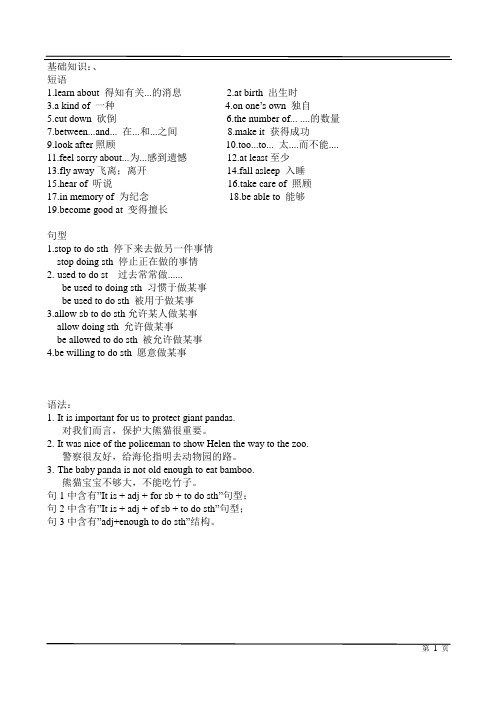
基础知识:、短语1.learn about 得知有关...的消息2.at birth 出生时3.a kind of 一种4.on one’s own 独自5.cut down 砍倒6.the number of... ....的数量7.between...and... 在...和...之间8.make it 获得成功9.look after照顾10.too...to... 太....而不能....11.feel sorry about...为...感到遗憾12.at least至少13.fly away飞离;离开14.fall asleep 入睡15.hear of 听说16.take care of 照顾17.in memory of 为纪念18.be able to 能够19.become good at 变得擅长句型1.stop to do sth 停下来去做另一件事情stop doing sth 停止正在做的事情ed to do st过去常常做......be used to doing sth 习惯于做某事be used to do sth 被用于做某事3.allow sb to do sth允许某人做某事allow doing sth 允许做某事be allowed to do sth 被允许做某事4.be willing to do sth 愿意做某事语法:1.It is important for us to protect giant pandas.对我们而言,保护大熊猫很重要。
2.It was nice of the policeman to show Helen the way to the zoo.警察很友好,给海伦指明去动物园的路。
3.The baby panda is not old enough to eat bamboo.熊猫宝宝不够大,不能吃竹子。
句1中含有”It is + adj + for sb + to do sth”句型;句2中含有”It is + adj + of sb + to do sth”句型;句3中含有”adj+enough to do sth”结构。
高中英语语法权威解析二---“It”用法及其句型和固定搭配讲解(附练习题)
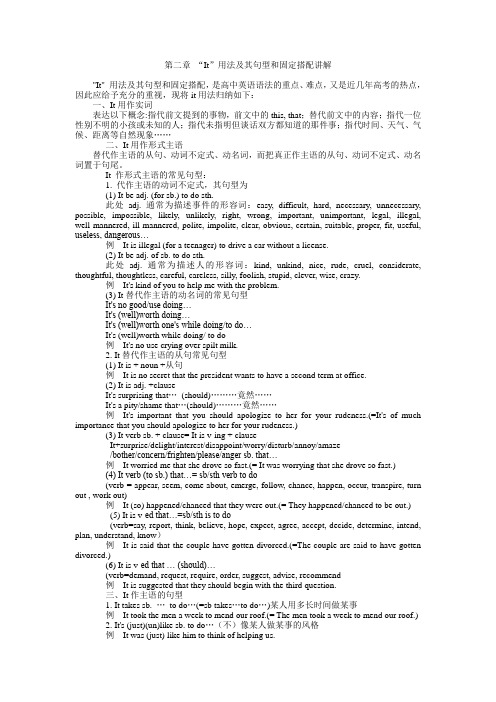
第二章“It”用法及其句型和固定搭配讲解"It" 用法及其句型和固定搭配,是高中英语语法的重点、难点,又是近几年高考的热点,因此应给予充分的重视,现将it用法归纳如下:一、It用作实词表达以下概念:指代前文提到的事物,前文中的this, that;替代前文中的内容;指代一位性别不明的小孩或未知的人;指代未指明但谈话双方都知道的那件事;指代时间、天气、气候、距离等自然现象……二、It用作形式主语替代作主语的从句、动词不定式、动名词,而把真正作主语的从句、动词不定式、动名词置于句尾。
It 作形式主语的常见句型:1. 代作主语的动词不定式,其句型为(1) It be adj. (for sb.) to do sth.此处adj. 通常为描述事件的形容词:easy, difficult, hard, necessary, unnecessary, possible, impossible, likely, unlikely, right, wrong, important, unimportant, legal, illegal, well-mannered, ill-mannered, polite, impolite, clear, obvious, certain, suitable, proper, fit, useful, useless, dangerous…例It is illegal (for a teenager) to drive a car without a license.(2) It be adj. of sb. to do sth.此处adj. 通常为描述人的形容词:kind, unkind, nice, rude, cruel, considerate, thoughtful, thoughtless, careful, careless, silly, foolish, stupid, clever, wise, crazy.例It's kind of you to help me with the problem.(3) It替代作主语的动名词的常见句型It's no good/use doing…It's (well)worth doing…It's (well)worth one's while doing/to do…It's (well)worth while doing/ to do例It's no use crying over spilt milk.2. It替代作主语的从句常见句型(1) It is + noun +从句例It is no secret that the president wants to have a second term at office.(2) It is adj. +clauseIt's surprising that…(should)………竟然……It's a pity/shame that…(should)………竟然……例It's important that you should apologize to her for your rudeness.(=It's of much importance that you should apologize to her for your rudeness.)(3) It verb sb. + clause= It is v-ing + clauseIt+surprise/delight/interest/disappoint/worry/disturb/annoy/amaze/bother/concern/frighten/please/anger sb. that…例It worried me that she drove so fast.(= It was worrying that she drove so fast.)(4) It verb (to sb.) that…= sb/sth verb to do(verb = appear, seem, come about, emerge, follow, chance, happen, occur, transpire, turn out , work out)例It (so) happened/chanced that they were out.(= They happened/chanced to be out.)(5) It is v-ed that…=sb/sth is to do(verb=say, report, think, believe, hope, expect, agree, accept, decide, determine, intend, plan, understand, know)例It is said that the couple have gotten divorced.(=The couple are said to have gotten divorced.)(6) It is v-ed that … (should)…(verb=demand, request, require, order, suggest, advise, recommend例It is suggested that they should begin with the third question.三、It作主语的句型1. It takes sb. …to do…(=sb takes…to do…)某人用多长时间做某事例It took the men a week to mend our roof.(= The men took a week to mend our roof.)2. It's (just)(un)like sb. to do…(不)像某人做某事的风格例It was (just) like him to think of helping us.3. It's (about/high) time that…should /v-ed…是该做某事的时候了例It's(about/high) time that we should take action.4. It's the x-th time (that) …have v-ed…第几次做某事了例It's the third time that he has failed the driving test.5. It is/has been…since …continuous v-ed(延续性动词) 某动作已有多长时间不发生了例It's 10 years that he lived here6. It was(not)…before…过(不)了多长时间某动作发生了例It was not long before they arrived.四、It 作形式宾语用来替代作宾语的从句、动词不定式、动名词,而把真正作宾语的从句、动词不定式、动名词置于句尾。
itis+adj.ofsb.todo句型讲解与练习

( )2.
It’s ___ for us ___ polite in class.
A.interesting, to become
B.good, to
C.important, to
D. necessary, to be
( )3.
___ careless of you to make lots of mistakes.
It's very nice of you to help me. 你来帮助我,你真是太好了。
2.形容词说的是“事物”It is + adj.+for sb.+ (not) to do
for sb. 常用于表示事物的特征特点,表示客观形式的形容词,如easy, hard, difficult, interesting, important, impossible等
C. to play sports
D. to playing sports
It is + adj. of sb. to do句型讲解与练习(总1页)
It is + adj. (for/ofsb.) to do sth.句型
1.形容词说的是“人”:It is + adj.+of sb.+ (not) to do
of sb的句型一般用表示人物的性格,品德,表示主观感情或态度的形容词,如good, kind, nice, clever, foolish, right。
---You’d better not. It’s bad for you _____too much junk food.
A.eat
B.to eat
八年级英语上册Unit2Howoftendoyouexercise讲义+习题人教新目标版(2021

八年级英语上册Unit 2 How often do you exercise讲义+习题(新版)人教新目标版编辑整理:尊敬的读者朋友们:这里是精品文档编辑中心,本文档内容是由我和我的同事精心编辑整理后发布的,发布之前我们对文中内容进行仔细校对,但是难免会有疏漏的地方,但是任然希望(八年级英语上册Unit 2 How often do you exercise讲义+习题(新版)人教新目标版)的内容能够给您的工作和学习带来便利。
同时也真诚的希望收到您的建议和反馈,这将是我们进步的源泉,前进的动力。
本文可编辑可修改,如果觉得对您有帮助请收藏以便随时查阅,最后祝您生活愉快业绩进步,以下为八年级英语上册Unit 2 How often do you exercise讲义+习题(新版)人教新目标版的全部内容。
Unit2。
How often do you exerciseShe exercises the dog every day。
每天她都遛狗。
【拓展】exercise作名词时,意为“锻炼;运动"时是不可数名词,意为“体操;练习”时是可数名词.例如:I should eat less food and take more exercise. 我应该少吃饭,多锻炼。
We do morning exercise every morning.我们每天早上都晨练。
1。
junk food 垃圾食品 (不可数)2。
drink milk 喝牛奶3. three or /to four times a week 一周三到四次4。
eat fruit 吃水果5. want 用法A.want( sb。
) to do sth. 想要某人做某事6. be good/bad for 对……有好处/坏处7。
go camping in the country 去乡下露营8. play sports 做运动=do sports9. one to three times a week 一周一至三次10。
itis+adj.ofsb.todo句型讲解与练习

It is + adj. (for/ofsb.) to do sth.句型
1.形容词说的是“人”:It is + adj.+of sb.+ (not) to do
of sb的句型一般用表示人物的性格,品德,表示主观感情或态度的形容词,如good, kind, nice, clever, foolish, right。
A.That’s
B. It’s
C. It
D. Its
( )4.
It’s very nice ___ you to get me two tickets ____ the World Cup.
;of
;for
C. to;for
பைடு நூலகம்D. of; to
( )5.
---I often have hamburgers forlunch.
It's very hard for him to study two languages. 对他来说学两门外语是很难的。
选择题
( ) 1.
It’s clever ___ you ___ so many toy ships.
A.of; making
B. of; to make
C. for; to make
---You’d better not. It’s bad for you _____too much junk food.
eat
D. ate
( )6.
It’s good for us ______ every day.
A. play sports
B. playing sports
实用综合教程教案(Unit 1-1)
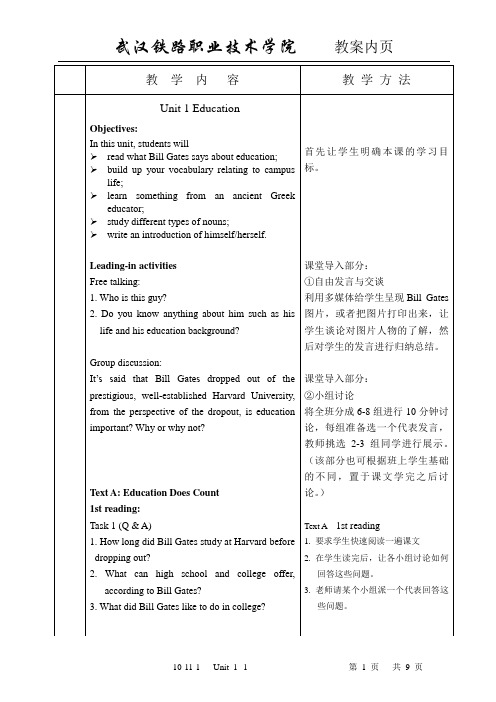
2.Do you know anything about him such as his life and his education background?
Group discussion:
It’s said that Bill Gates dropped out of theprestigious, well-establishedHarvard University, from the perspective of the dropout, is education important? Why or why not?
inlow/poor spirits意志消沉,垂头丧气
12.highly adv.高度地,非常
e.g. a highly interesting story
a highly paid job
speak highly of赞扬,对…给予很高评价
e.g. The leader speaks highly of their work.
3.What did Bill Gates like to do in college?
首先让学生明确本课的学习目标。
课堂导入部分:
自由发言与交谈
利用多媒体给学生呈现Bill Gates图片,或者把图片打印出来,让学生谈论对图片人物的了解,然后对学生的发言进行归纳总结。
课堂导入部分:
小组讨论
将全班分成6-8组进行10分钟讨论,每组准备选一个代表发言,教师挑选2-3组同学进行展示。(该部分也可根据班上学生基础的不同,置于课文学完之后讨论。)
(able).
6.The new machine is____(automatic) controlled.
形容词和副词讲解和习题练习(含答案)[2]
![形容词和副词讲解和习题练习(含答案)[2]](https://img.taocdn.com/s3/m/5f0fb2ce453610661fd9f40b.png)
形容词和副词讲解和习题练习(含答案)(word版可编辑修改)编辑整理:尊敬的读者朋友们:这里是精品文档编辑中心,本文档内容是由我和我的同事精心编辑整理后发布的,发布之前我们对文中内容进行仔细校对,但是难免会有疏漏的地方,但是任然希望(形容词和副词讲解和习题练习(含答案)(word版可编辑修改))的内容能够给您的工作和学习带来便利。
同时也真诚的希望收到您的建议和反馈,这将是我们进步的源泉,前进的动力。
本文可编辑可修改,如果觉得对您有帮助请收藏以便随时查阅,最后祝您生活愉快业绩进步,以下为形容词和副词讲解和习题练习(含答案)(word版可编辑修改)的全部内容。
高中英语-—形容词和副词一、考点、热点回顾形容词1、形容词的一般用法(1)。
作定语,一般放在所修饰词的前面。
It’s a cold and windy day。
(2.)作表语,放在系动词的后面。
(look, feel, smell, sound…。
)He looks happy today.(3.)形容词修饰something,anything,nothing,everything等复合不定代词时,须放在其后。
Would you like something hot to drink?(4。
)表示长、宽、高、深及年龄的形容词,应放在相应的名词之后。
How long is the river? It’s about two hundred metres long.(5。
)只能作表语的形容词:afraid;alone;asleep;awake;alive;well健康的;ill;frightened The man is ill。
(正)The ill man is my uncle。
(误)(6。
)只能作定语的形容词:little小的;only唯一的;wooden木质的;woolen羊毛质的;elder年长的My elder brother is in Beijing。
非谓语动词讲解(附练习及答案)
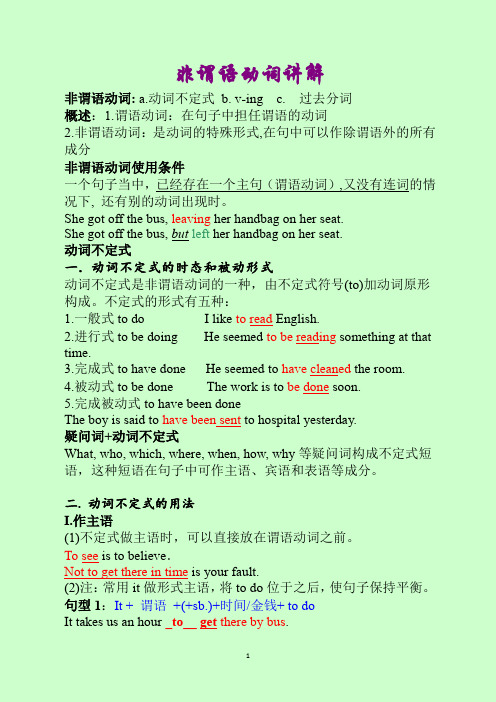
非谓语动词讲解非谓语动词: a.动词不定式 b. v-ing c. 过去分词概述:1.谓语动词:在句子中担任谓语的动词2.非谓语动词:是动词的特殊形式,在句中可以作除谓语外的所有成分非谓语动词使用条件一个句子当中,已经存在一个主句(谓语动词),又没有连词的情况下, 还有别的动词出现时。
She got off the bus, leaving her handbag on her seat.She got off the bus, but left her handbag on her seat.动词不定式一.动词不定式的时态和被动形式动词不定式是非谓语动词的一种,由不定式符号(to)加动词原形构成。
不定式的形式有五种:1.一般式to do I like to read English.2.进行式to be doing He seemed to be reading something at that time.3.完成式to have done He seemed to have cleaned the room.4.被动式to be done The work is to be done soon.5.完成被动式to have been doneThe boy is said to have been sent to hospital yesterday.疑问词+动词不定式What, who, which, where, when, how, why等疑问词构成不定式短语,这种短语在句子中可作主语、宾语和表语等成分。
二. 动词不定式的用法I.作主语(1)不定式做主语时,可以直接放在谓语动词之前。
To see is to believe.Not to get there in time is your fault.(2)注:常用it做形式主语,将to do位于之后,使句子保持平衡。
句型1:It + 谓语+(+sb.)+时间/金钱+ to doIt takes us an hour _to__ get there by bus.It costs you only $ 100 a month to cook at home.It seemed impossible to save money.句型2:It’s + n. (+ for sb) + to doIt’s our duty _to_ help the poor.It is a great enjoyment _to_ spend our holiday in the countryside..It is a great honor for us to be present at your birthday party.句型3:It is + adj (+ for sb)to do sth(是形容事物的性质的)It is + adj (+ of sb)to do sth(是形容人的品质的)It is easy for me to finish this work before ten.It is very kind of you to give me some help.It's impolite of you to speak to the teacher like that.疑问词+不定式作主语When to start remains undecided.1.It is easy to get there by bus or taxi.2. It takes about 3 hours to see all the birds.3. It is also impolite to speak with your mouth full when you are eating.4. It’s our duty to take good care of the old.5. How long did it take you to finish the work?6. It is stupid of you to write down everything the teacher says.7. When to start has not been decided.8. It seemed selfish of him not to give them anything.9. It’s necessary for you to lock the car when you do not use it.10. It is useful for our health to do morning exercises.II.作宾语接不定式做宾语I want to know this matter.I don’t expect to meet you here(1)常见动词有:like, demand, expect, promise, begin, determine, refuse, fail, manage, learn, seem, forget, want, prepare, pretend, plan, wish等They want to get_( get ) on the bus, didn’t they?He said he wished __to be ( be ) a professor.(2)it作形式宾语I find/feel to work with him interesting .I find/feel it interesting to work with him.Subject+ find/think/feel/make/ consider… it+adj/n + to do sth.1.We thought_it__better__to_start early.2.Do you consider_it__better not_to_go?3.I feel_it_my duty_to_change all that.4.We think it __ important _ to _ obey the law.5.I know _ it _ impossible _ to _ finish so much homework in a day. (3)疑问词+不定式作宾语常常放在这些动词的后面作宾语:tell, advise, show, teach, find out, decide, discuss, learn, explain…He taught us how to use the tool.No one could tell me where to get the book.The dictionary didn’t tell the Frenchman how to pronounce the word.(4) 作介词but, except, besides的宾语。
高一(5)动词不定式讲解、练习

高一英语暑期复习材料(5)词汇巩固A Horrible Earthquake可怕的地震Dirty water rose in well s and canal s before the e . But no one (判断) that an earthquake was coming. Suddenly, everything shook. It seemed(似乎)he world was (结束). Millions brick houses and(许多)dam s were d . Railway track s became useless bar s. Pipe s in mine s (爆裂)and let out smelly steam. Huge crack s t cyclist s everywhere.The next day, this (事件)was the headline or main(标题)of all newspapers. With the reporter s giving an outline of the (灾难), the whole(国家)was shock ed by the damage and the victim’s extreme s . People were moved when they read that the survivors comforted each other by saying “Congratulations! You survived!” So they not only (表达)their sympathy sincerely, but also organized together to help the victims (立刻). The (受伤的)were rescue d and the dead were buried. The (吓坏的)survivors were dug out from under the (废墟) and were offered (避难所)fresh water and electricity. ____________(幸亏) people’s help, the loss was minimized.The Great President伟大的总统As the (创始人)of the republic, the president had many good (品质). Before coming to p , he was a generous (律师). He()selflessly help everyone who(向……求助)him. He accepted no (费用)to offer legal guidance and (意见)to those who were (失业)or un educate d. Later, believing all mankind to be(平等的), he devote d himself stopping the u anti-black laws. He (建立)the Black Youth League and was v to be the leader. However, though he kept (和平的)principle s without violence and terror, his(卑鄙的)enemies still blewhis house and (袭击)his relative s, and he himself couldn’t (逃脱)be ing sentenced 30 years in prison.Not fearing of the prison guards’ cruelty, he kept (积极的)and beg ged no mercy from them. ______________________________(事实上), he was always h and never(灰心)during the stage even though he was (处于困难中).Finally, people (回报)him with the leader’s position and a gold blanket.非谓语动词1 —动词不定式非谓语动词: a.动词不定式 b.动名词 c.分词( 现在分词过去分词)概述:1.谓语动词:在句子中担任谓语的动词2.非谓语动词:是动词的特殊形式,在句中可以作除谓语外的所有成分非谓语动词使用条件一个句子当中,已经存在一个主句(谓语动词),又没有连词的情况下, 还有别的动词出现时。
特殊句式讲解
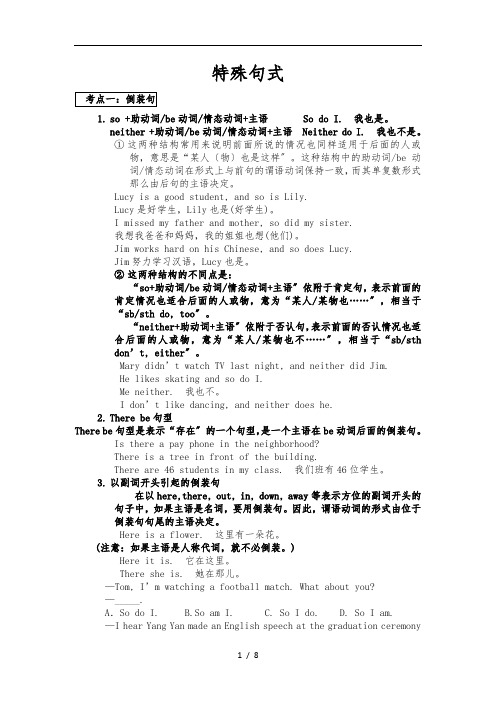
特殊句式1.so +助动词/be动词/情态动词+主语 So do I. 我也是。
neither +助动词/be动词/情态动词+主语 Neither do I. 我也不是。
①这两种结构常用来说明前面所说的情况也同样适用于后面的人或物,意思是“某人〔物〕也是这样〞。
这种结构中的助动词/be动词/情态动词在形式上与前句的谓语动词保持一致,而其单复数形式那么由后句的主语决定。
Lucy is a good student, and so is Lily.Lucy是好学生,Lily也是(好学生)。
I missed my father and mother, so did my sister.我想我爸爸和妈妈,我的姐姐也想(他们)。
Jim works hard on his Chinese, and so does Lucy.Jim努力学习汉语,Lucy也是。
②这两种结构的不同点是:“so+助动词/be动词/情态动词+主语〞依附于肯定句,表示前面的肯定情况也适合后面的人或物,意为“某人/某物也……〞,相当于“sb/sth do, too〞。
“neither+助动词+主语〞依附于否认句,表示前面的否认情况也适合后面的人或物,意为“某人/某物也不……〞,相当于“sb/sthdon’t, either〞。
Mary didn’t watch TV last night, and neither did Jim.He likes skating and so do I.Me neither. 我也不。
I don’t like dancing, and neither does he.2.There be句型There be句型是表示“存在〞的一个句型,是一个主语在be动词后面的倒装句。
Is there a pay phone in the neighborhood?There is a tree in front of the building.There are 46 students in my class. 我们班有46位学生。
常见动词不定式词组、句型用法总结[推荐5篇]
![常见动词不定式词组、句型用法总结[推荐5篇]](https://img.taocdn.com/s3/m/bf6faf5f1611cc7931b765ce05087632311274ce.png)
常见动词不定式词组、句型用法总结[推荐5篇]第一篇:常见动词不定式词组、句型用法总结常见动词不定式词组、句型用法总结.固定用法(非谓语动词):以下是带to的动词不定式常见搭配1.希望做某事hope to do sth.2.决定做某事decide to do sth3.同意做某事agree to do sth.4.需要某人做某事need to do sth..5.使用某物做某事use sth to do sth6.计划做某事plan to do sth.It’s +adj.for/of sb.to do sth.对于某人来说做某事是……(当adj.是表示性格、品德的形容词时用of)例句: It is easy for me to learn it well.It is very kind/foolish/nice of you to do so.★find/think/feel it +adj.to do sth.发现/认为/感到做某事是… 例: I find/think/feel it hard to learn English well.★序数词+to do 第…..个做某事例句:Who is the first to get there?★我不知/忘记了怎么办。
I didn't know/forgot what to do.★ 离开房间时不要忘记/记住关灯例句:Don’t forget/Remember to turn off the lights when you left the room以下是不带to的动词不定式(即动词原形)的常见用法★ let sb.do sth让某人做某事★ make do sth使得某人做某事★ hear do sth do sth听见某人做某事why not 或why don’t you +动词原形?为什么不….?(表示建议)例:Why not/Why don’t you take a walk?★ 某人+had better(not)do 某人最好(不)做某事★ 情态动词can/may /must /should+ 动词原形(包括情态动词的否定形式+动词原形)★ 助动词do/does/did/will/would在构成疑问句或者构成否定句即don’t/doesn’t /didn’t/will not/would not+ 动词原形★ be going to + 动词原形(表示“即将”“打算”15.动词+to(19)1)add to增添2)agree to同意3)attend to处理4)belong to属于5)devote to贡献给6)get to到达7)lead to导致,通向8)object to反对9)point to指向10)reply to答复做某事)第二篇:动词不定式用法小结动词不定式用法小结动词不定式是一种非谓语动词形式,其结构为“to+动词原形”,其中to不是介词,而是动词不定式的符号,称为小品词,动词不定式没有人称和数的变化。
It is + adj. of sb. to do句型讲解与练习
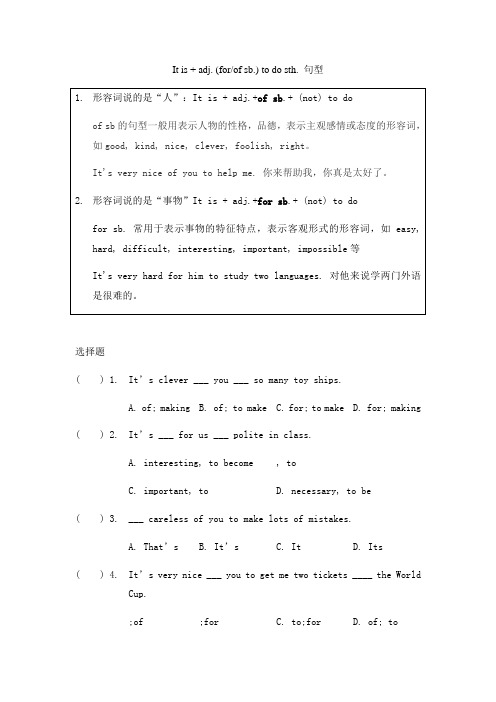
;for
C. to;for
D. of; to
( )5.
---I often have hamburgers forlunch.
---You’d better not. It’s bad for you _____too much junk food.
eat
D. ate
( )6.
It’s good for us ______ every day.
of sb的句型一般用表示人物的性格,品德,表示主观感情或态度的形容词,如good, kind, nice, clever, foolish, right。
It's very nice of you to help me. 你来帮助我,你真是太好了。
2.形容词说的是“事物”It is + adj.+for sb.+ (not) to do
nottodoofsb的句型一般用表示人物的性格品德表示主观感情或态度的形容词如goodkindnicecleverfoolishright
It is + adj. (for/ofsb.) to do sth.句型
1.形容词说的是“人”:It is + adj.+of sb.+ (not) to do
for sb. 常用于表示事物的特征特点,表示客观形式的形容词,如easy, hard, difficult, interesting, important, impossible等
It's very hard for him to study two languages. 对他来说学两门外语是很难的。
选择题
( ) 1.
It’s clever ___ you ___ so many toy ships.
itis+adj.ofsb.todo句型讲解与练习

It is + adj. of(for) sb. to do句型讲解与练习(共2页)
It is + adj. (for/ofsb.) to do sth.句型
1.形容词说的是“人”:It is + adj.+of sb.+ (not) to do
of sb的句型一般用表示人物的性格,品德,表示主观感情或态度的形容词,如good, kind, nice, clever, foolish, right。
It's very nice of you to help me.你来帮助我,你真是太好了。
2.形容词说的是“事物”It is + adj.+for sb.+ (not) to do
for sb.常用于表示事物的特征特点,表示客观形式的形容词,如easy, hard, difficult, interesting, important, impossible等 for you _____too much junk food.
eat
D.ate
( )6.
It’s good for us ______ every day.
A. play sports
B. playing sports
C. to play sports
D. for; making
( )2.
It’s ___ for us ___ polite in class.
A.interesting, to become
, to
C.important, to
D. necessary, to be
( )3.
___ careless of you to make lots of mistakes.
Itis+adj.ofsb.todo句型讲解与练习

It is + adj. (for/of sb.) to do sth. 句型1.形容词说的是“人”: It is + adj.+of sb .+ (not) to doof sb 的句型一般用表示人物的性格,道德,表示主观感情或态度的形容词,如 good, kind, nice, clever, foolish, right。
It's very nice of you to help me.你来帮助我,你真是太好了。
2.形容词说的是“事物” It is + adj.+for sb.+ (not) to dofor sb. 常用于表示事物的特点特点,表示客观形式的形容词,如easy, hard, difficult, interesting, important, impossible等It's very hard for him to study two languages.对他来说学两门外语是很难的。
选择题() 1.It ’s clever ___ you ___ so many toy ships.A. of; makingB. of; to makeC. for; to makeD. for; making () 2.It ’s ___ for us ___ polite in class.A. interesting, to become, toC. important, toD. necessary, to be() 3.___ careless of you to make lots of mistakes.A. That ’ sB. It ’ sC. ItD. Its() 4.It ’s very nic e ___ you to get me two tickets ____ the World Cup.;of;for C. to;for D. of; to( ) 5.---I often have hamburgers for lunch.---You’d better not. It ’s bad for you _____too much junk food.eat D. ate ( ) 6.It ’s good for us ______ every day.A.playB. playing sportssportsC. to play sportsD. to playing sports。
冀教版初中英语八年级动词不定式(讲解+练习)(1)

动词不定式1. 动词不定式位置:(1)动词不定式作表语To lose is to learn. 失败就是学习。
Ψ表语表语是谓语的一部分,它位于系动词如be之后,说明主语身份,特征,属性或状态。
一般由名词,代词,形容词,副词,不定式,介词短语等充当。
I am a teacher.(2)动词不定式作主语It is better to give than to take. 给予比接受更好。
Ψ主语主语表示句子主要说明的人或事物,一般由名词,代词,数词,不定式等充当。
He likes watch TV.(3)不定式作宾语Expect to be treated as you have treated others.你怎样待别人,就指望别人怎样待你。
Ψ宾语宾语表示动作行为的对象,跟在及物动词之后。
能作宾语的有名词,代词,数词,动词不定式等。
We all like play basketball.√.I’ve worked with children before, so I know what ________ in my new job.A. expectedB. to expectC. to be expectingD. expects(4)不定式作宾补Adversity causes some men to break,others to break records.逆境使一些人崩溃,也使一些人破记录。
Ψ宾补就是宾语补足语,就是补充说明宾语的。
I know you are a student good at maths.(在这个句子中,good at maths 就是补语) I know you are a student who is good at maths.(宾语补语也可以是句子)I see you crossing the street.(还可以是-ing 形式)√. I saw him _______ out of the room.A. goB. had goneC. has goneD. goes(5)不定式作定语There is a time to talk and a time to act.该说的时候说,该做的时候做。
It is adj for sb to do 还是It is adj of sb to do

It is adj for sb to do还是It is adj ofsb to do一、例题分析:In China,it's impolite to use your chopsticks to hit an empty bowl.在该句中,It为形式主语,真正的主语是后面的动词不定式,该句结构为:It is+adj.+to do sth.意为"做某事是……的"。
有时在to do sth.前加上for或of sb.,表示动词不定式(短语)的逻辑主语。
如:It's difficult for me to work out this physics problem.it's very kind of you to help me.那么,It is+adj.for sb+to do sth.与It is+adj.of sb+to do sth.有何区别呢?It is+adj.for sb+to do sth.中的形容词通常为difficult, easy,hard,important,(im)possible,necessary等,这类形容词用来描述的是事物的特征。
而It is+adj.of sb+to do sth.中的形容词通常为kind,good, nice,polite,clever,careless,foolish等,这类形容词用来描述的是人的性格、品质特征。
二、练习。
1.It is___for Chinese families to have cars and computers in their homes.A.unluckymonC.ready2.It is good____our health____vegetables.A.for,to eatB.with,eatC.at,eating3.It’s difficult____us____the work.A.for,to finishB.with,finishC.of,finish4.It’s very nice____you____me a seat.A.for,offerB.of,to offerC.of,offer答案:1.B2.A3.A4.B。
- 1、下载文档前请自行甄别文档内容的完整性,平台不提供额外的编辑、内容补充、找答案等附加服务。
- 2、"仅部分预览"的文档,不可在线预览部分如存在完整性等问题,可反馈申请退款(可完整预览的文档不适用该条件!)。
- 3、如文档侵犯您的权益,请联系客服反馈,我们会尽快为您处理(人工客服工作时间:9:00-18:30)。
1.形容词说的是“人”:It is + adj.+of sb.+ (not) to do
of sb的句型一般用表示人物的性格,品德,表示主观感情或态度的形容词,如good, kind, nice, clever, foolish, right。
2.形容词说的是“事物”It is + adj.+for sb.+ (not) to do
for sb. 常用于表示事物的特征特点,表示客观形式的形容词,如easy, hard, difficult, interesting, important, impossible等
选择题:
1. It’s clever ___ you ___ so many toy ships.
A.of; making
B. of;
to make C. for;
to make
D. for;
making
2. It’s ___ for us ___ polite in class.
A.interesting,
to become
B.good, to
C. important, to be
D. necessary, to be
3. ___ careless of you to make lots of mistakes.
A. That’s
B. It’s
C. It
D. Its
4. It’s very nice ___ you to get me two tickets ____ the World Cup.
B.of;of
C. to;for
D. of; to
A.for;of
ticket for/to sth
5. ---I often have hamburgers for lunch.
---You’d better not. It’s bad for you _____too much junk food(垃圾食品).
A.eat
B.to eat
C.eating
D. ate
6. It’s good for us ______ every day.
A. play sports
B. playing sports
C. to play sports
D. to playing sports
汉译英:
1. 你来帮助我,你真是太好了。
nice
2. 对他来说学两门外语是很难的。
hard、difficult
参考答案:1---6: BCBDBC
1.it is very nice of you to help me.
2. it is very hard for him to learn two foreign languages.。
